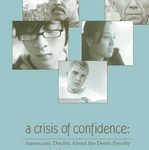A Crisis of Confidence: Americans’ Doubts About the Death Penalty
Posted on Jun 09, 2007

Executive Summary Top
According to a national public opinion poll conducted in 2007, the public is losing confidence in the death penalty. People are deeply concerned about the risk of executing the innocent, about the fairness of the process, and about the inability of capital punishment to accomplish its basic purposes. Most Americans believe that innocent people have already been executed, that the death penalty is not a deterrent to crime, and that a moratorium should be placed on all executions.
Many in America also believe they would be disqualified from serving on a jury in a capital case because of their moral objections. Among women and Catholics, nearly half believe they would be excluded. Two-thirds of blacks believe they would be disqualified. Even among those who support the death penalty and believe they would be qualified to serve on a capital jury, the risk of convicting or executing the innocent would make them less likely to vote for a death sentence.
While a majority still support the death penalty in theory, it is becoming irrelevant to many Americans because it is rarely applied, and not always to the worst offenders. Life without parole sentences are becoming more attractive to many Americans, and it is the preferable choice over the death penalty for major subgroups of the population. Two-thirds of Americans do not believe that reforms of the death penalty system will eliminate its problems.
The public’s lack of confidence in the death penalty is being echoed by representatives of victims’ groups, by former supporters of the death penalty, and in the editorial pages of the nation’s newspapers. Although the dissatisfaction with capital punishment has many roots, the common and principal concern heard throughout the country is the risk that innocent people may be caught up with the guilty.
Additional Resources Top
Read a summary of the media coverage of A Crisis of Confidence here.